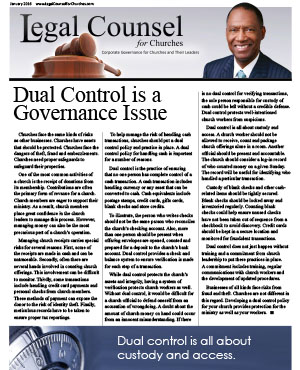Churches face the same kinds of risks as other businesses. Churches have assets that should be protected. Churches face the dangers of theft, fraud and embezzlements. Churches need proper safeguards to safeguard their properties.
One of the most common activities of a church is the receipt of donations from its membership. Contributions are often the primary form of revenue for a church. Church members are eager to support their ministry. As a result, church members place great confidence in the church leaders to manage this process. However, managing money can also be the most precarious part of a church’s operation.
Managing church receipts carries special risks for several reasons. First, some of the receipts are made in cash and can be untraceable. Secondly, often there are several hands involved in counting church offerings. This involvement can be difficult to monitor. Thirdly, some transactions include handling credit card payments and personal checks from church members. These methods of payment can expose the donor to the risk of identity theft. Finally, meticulous records have to be taken to ensure proper tax reportings.
To help manage the risk of handling cash transactions, churches should put a dual control policy and practice in place. A dual control policy for handling cash is important for a number of reasons.
Dual control is the practice of ensuring that no one person has complete control of a cash transaction. A cash transaction includes handling currency or any asset that can be converted to cash. Cash equivalents include postage stamps, credit cards, gifts cards, blank checks and store credits.
To illustrate, the person who writes checks should not be the same person who reconciles the church’s checking account. Also, more than one person should be present when offering envelopes are opened, counted and prepared for a deposit to the church’s bank account. Dual control provides a check and balance system to ensure verification is made for each step of a transaction.
While dual control protects the church’s assets and integrity, having a system of verification protects church workers as well. Without dual control, it would be difficult for a church official to defend oneself from an accusation of wrongdoing. A doubt about the amount of church money on hand could occur from an innocent misunderstanding. If there is no dual control for verifying transactions, the sole person responsible for custody of cash could be left without a credible defense. Dual control protects well-intentioned church workers from suspicions.
Dual control is all about custody and access. A church worker should not be allowed to receive, count and package church offerings alone in a room. Another official should be present and accountable. The church should consider a log-in record of who counted money on a given Sunday. The record will be useful for identifying who handled a particular transaction.
Custody of blank checks and other cash- related items should be tightly secured. Blank checks should be locked away and inventoried regularly. Counting blank checks could help ensure unused checks have not been taken out of sequence from a checkbook to avoid discovery. Credit cards should be kept in a secure location and monitored for fraudulent transactions.
Dual control does not just happen without training and a commitment from church leadership to put these practices in place. A commitment includes training, regular communications with church workers and the development of updated procedures.
Businesses of all kinds face risks from fraud and theft. Churches are not different in this regard. Developing a dual control policy for your church provides protection for the ministry as well as your workers.

